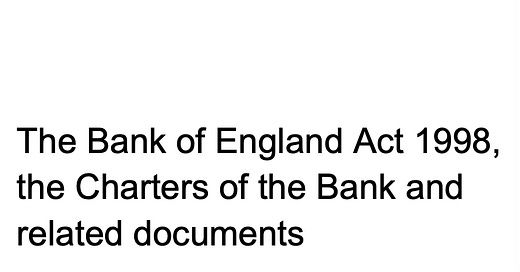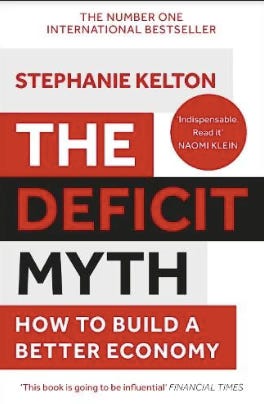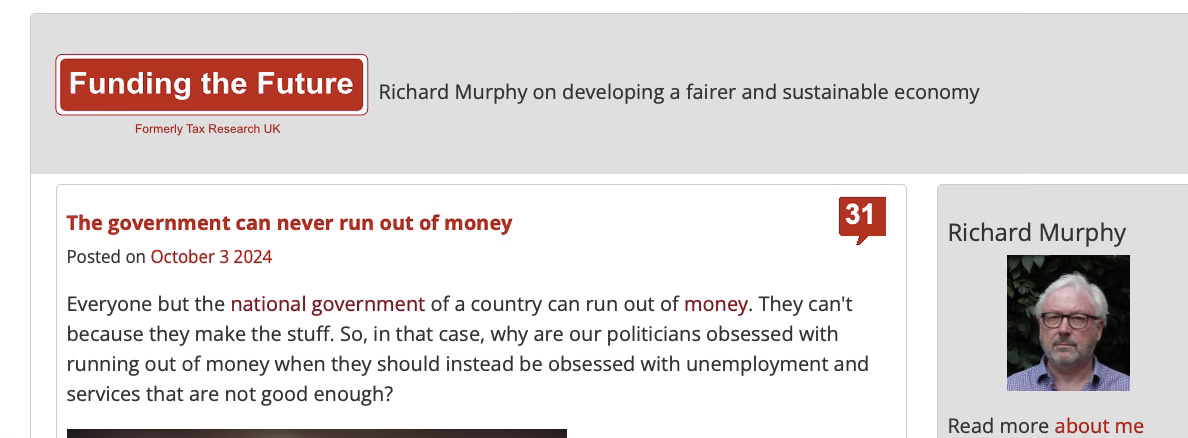Why the government can create all the money required to meet people's needs.
And why English Labour's austerity is completely unnecessary
A reader challenged me on something I wrote in my recent post, “English Labour isn’t the answer to anything.” He objected strongly to my statement that Rachel Reeves’ austerity is entirely unnecessary since the UK Treasury owns a central bank that it can order to create all the money required to meet people’s needs.
No no no no no. If you believe this then nothing about your blog is in any way reliable.
I responded:
Politely, you know nothing about economics or how a government with a fiat currency creates money. I suggest you read Stephanie Kelton's The Deficit Myth or peruse Richard Murphy's blog, Funding the Future, to learn more. [Murphy recently wrote an excellent piece on why the government can never run out of money.] And ask yourself how the government created billions in 2008 and 2020, and can always find the money to fund wars.
My reader pushed back and I answered again. Then he came back a third time, still not convinced. At this point, I gave up trying to explain. However, another reader, Ken Mathieson, weighed in. With Ken’s permission, I’m publishing for the benefit of all my readers, his comments below.
Well, where to start?
1. While Fiat currency can indeed be printed, by far the bulk of it is NOT printed: it is created by simple debit & credit bookkeeping either A) by the Bank of England (BoE) on instruction by the Treasury (i.e. the UK Government in the person of the Chancellor of the Exchequer) in order to prevent a shutdown of the economy (i.e. Quantitative Easing during Covid lockdowns or to prevent the commercial banks going bust as in 2008), or B) by Commercial Banks authorised by Government licence to issue loans. In all cases it’s the UK Gov which ‘promises to pay the bearer’ and not the BoE and commercial banks. Why don’t you read it yourself? Here’s the link to current governance documents: https://www.bankofengland.co.uk/-/media/boe/files/about/legislation/boe-charter.pdf
2. You should really broaden your understanding of how economics – macro and micro – function. Stephanie Kelton’s book as mentioned by Leah is first-class, is written in clear and understandable language and, although it analyses the topics from an American perspective, these can easily be translated into their UK equivalents. You can get the paperback from Amazon for under a tenner.
3. Another useful learning arena is Prof Richard Murphy’s blog site taxresearch.org.uk or his various other outputs via YouTube, Twitter/X, etc. The blogsite is particularly useful as all readers are invited to contribute to debate and ask questions. There you can learn how the UK economy works, how Government policies affect the economy, what Modern Monetary Theory (MMT) is, which just explains how the economy actually functions, the impact of Westminster on Scottish politics and on the Scottish economy, and why GERS (General Expenditure and Revenue Scotland) is total crap, designed to make Scotland look poor and dependent on England. His strongest pieces are those on economics.
The benefit of Murphy’s blog is that it's a proper forum where differing viewpoints will be discussed, whereas Prof Murphy's Twitter & YouTube output is generally his opinion alone unless he's interviewing someone.
4. You state that “When inflation grows at 5% this means that a government has printed 5% more currency than the economy grew.” It’s not a direct correlation: recent inflation in the UK has occurred in part simply because the BoE has kept the Bank rate artificially high at 5.25 from August 2023 to August 2024 and it now sits at 5%. This has pushed up the cost of mortgages and rentals which has not only fuelled inflation but has depressed consumption and investment, hurting poorer households the most and worsening inequality. Control of the Bank Rate is the only tool the BoE has to control inflation, which in turn is the only macro-economic power it has. However, the Chancellor could remove the BoE’s monopoly on interest rates with a simple phone call and letter/email to Bank Governor Bailey.
5. The word “Borrowing” is used as a useful tool in the long-running obfuscation of what really happens in the economy. Once you’ve grasped the fact that the UK Government effectively runs an overdraft at the BoE (which it owns), the use of the word “borrowing” is how it chooses to disguise the fact that it is simply “borrowing” from itself and the various debits and credits cancel each other out in the Whole of Government Accounts.
It doesn’t mean going cap in hand to the City of London or the World Bank. The analogy I use to explain this is: My lawn is growing fast and badly needs to be cut. I google ‘gardeners in my area’ and the cheapest wants £200 to cut it. I decide to cut it myself, but then, having read about fiscal management in the mainstream press, I wonder if I’ll have to pay myself £200 and, if so, how do I do it? Do I have to transfer £200 from my left trouser pocket to the right trouser pocket and, if so, will I sleep any better knowing that I’m no longer in debt? Obviously it’s bleeding nonsense, but then so is the insistence of Government and the media about “how do we pay for Government expenditure?”
6. You state regarding Quantitative Easing (QE), “What happened in 2008 was a travesty. Those banks should have been allowed to fail, but the answer to one wrong is not another wrong.”
But think about the alternative: the commercial banks all go bust causing mass bankruptcy across all sectors (private, public and Government) of the economy – no food, no jobs, no income, no access to personal savings. The UK, particularly under the Tories and Blair, has never managed adequate regulation of key services and it’s the same today, but intervention and QE prevented complete meltdown, AND it didn’t cause any inflation.
Ken Mathieson
I’ll end by saying that the only constraints to government spending are inflation and the productive capacity of the economy. If there’s too much money chasing too few goods, the result is inflation. So the government’s job is to manage the balance between the money available to spend, and the goods and services available to buy. If it does that, as Clement Attlee’s Labour government did after World War II, the result is full employment with the economy’s resources - people, capital and natural resources - used productively to create wealth and wellbeing. John Maynard Keynes understood this balance. Sadly, subsequent UK governments, both the Tory and Labour, haven’t. And that’s why people are suffering needlessly.









Thanks, Leah.
great article Leah, thank you! I just read the New York Times article written on this very subject by the economist, Stephanie Kelton you quote. If the New York Times was prepared to print an equally controversial article that confirms everything you have said, by a former chief economist for the Senate Budget Committee, then I'm a total convert. You can't argue with that. This article should be printed on millions of little pieces of paper and dropped from the sky aright across the UK! Bravo Leah.